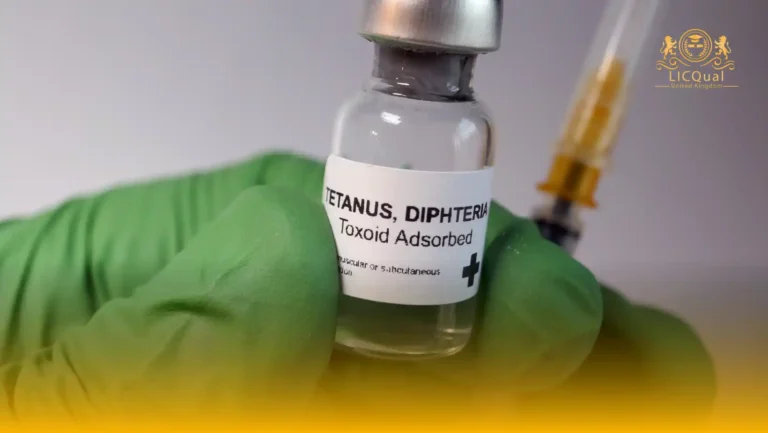The Level 7 Postgraduate Diploma in Healthcare Quality and Patient Safety is a prestigious qualification designed for healthcare professionals aiming to advance their careers in leadership, governance, and patient-centred care. This programme is not intended for fresh candidates but is tailored for experienced practitioners, managers, and decision-makers who want to deepen their expertise, strengthen their professional profile, and contribute to the highest standards of healthcare delivery.
Learners undertaking this diploma will gain advanced knowledge of healthcare quality frameworks, risk management strategies, patient safety systems, and regulatory compliance. The qualification also focuses on evidence-based practices, performance measurement, and the development of strategic approaches to improve patient outcomes across diverse healthcare settings.
This internationally recognised programme supports professionals in expanding their skills while enhancing their Continuing Professional Development (CPD). It equips learners with the tools to implement sustainable quality improvement initiatives, lead patient safety programmes, and influence organisational culture towards excellence in healthcare delivery.
Centres delivering this diploma must ensure that they have competent and qualified staff, supported by the necessary learning materials, resources, and facilities to guarantee high-quality teaching and learner success. A structured learning environment, combined with strong academic and practical guidance, ensures that learners are fully prepared to take on senior leadership roles in hospitals, healthcare organisations, and regulatory bodies.
By completing the Level 7 Postgraduate Diploma in Healthcare Quality and Patient Safety, learners position themselves as experts capable of driving innovation, ensuring compliance, and shaping the future of safe and effective healthcare systems worldwide.
Course Overview
Qualification Title
LICQual Level 7 Postgraduate Diploma in Healthcare Quality and Patient Safety
Total Units
6
Total Credits
120
GLH
600
Qualification #
LICQ2200795
Qualification Specification
To enroll in the LICQual Level 7 Postgraduate Diploma in Healthcare Quality and Patient Safety , applicants must meet the following criteria:
|
Qualification# |
Unit Title |
Credits |
GLH |
|---|---|---|---|
|
LICQ2200795-1 |
Advanced Principles of Healthcare Quality Management |
20 |
100 |
|
LICQ2200795-2 |
Patient Safety and Risk Management in Healthcare |
20 |
100 |
|
LICQ2200795-3 |
Clinical Governance and Regulatory Compliance |
20 |
100 |
|
LICQ2200795-4 |
Leadership in Quality and Patient Safety |
20 |
100 |
|
LICQ2200795-5 |
Healthcare Data Analytics and Quality Improvement |
20 |
100 |
|
LICQ2200795-6 |
Research Project in Healthcare Quality and Patient Safety |
20 |
100 |
By the end of this course, learners will be able to:
Unit 1: Advanced Principles of Healthcare Quality Management
- Critically evaluate international models and frameworks of healthcare quality management.
- Analyse the impact of evidence-based practices on healthcare service delivery.
- Develop strategies to embed continuous quality improvement within healthcare organisations.
- Assess the role of accreditation and benchmarking in achieving quality excellence.
Unit 2: Patient Safety and Risk Management in Healthcare
- Identify, assess, and mitigate risks that affect patient safety in healthcare systems.
- Evaluate patient safety policies, reporting systems, and incident investigation approaches.
- Implement proactive strategies for preventing medical errors and adverse events.
- Critically appraise the relationship between organisational culture and patient safety outcomes.
Unit 3: Clinical Governance and Regulatory Compliance
- Examine the principles and components of clinical governance frameworks.
- Assess the ethical and legal obligations of healthcare professionals in patient care.
- Evaluate compliance requirements with national and international healthcare regulations.
- Develop policies that integrate accountability, transparency, and patient-centred governance.
Unit 4: Leadership in Quality and Patient Safety
- Demonstrate advanced leadership skills to promote a culture of quality and safety.
- Analyse the role of leadership in driving transformational change in healthcare organisations.
- Apply strategic decision-making to implement quality and patient safety initiatives.
- Critically reflect on leadership challenges in multidisciplinary healthcare settings.
Unit 5: Healthcare Data Analytics and Quality Improvement
- Critically evaluate the use of data in monitoring healthcare quality and safety.
- Apply analytical tools to interpret patient outcome data and performance indicators.
- Develop data-driven strategies for healthcare quality improvement.
- Assess the effectiveness of audits, reporting systems, and performance measurement in healthcare.
Unit 6: Research Project in Healthcare Quality and Patient Safety
- Formulate a research question addressing a critical issue in healthcare quality and safety.
- Apply advanced research methods to investigate healthcare challenges.
- Critically analyse and interpret research findings to provide evidence-based recommendations.
- Present a comprehensive research project that contributes to professional practice and organisational improvement.
The LICQual Level 7 Postgraduate Diploma in Healthcare Quality and Patient Safety is designed for experienced healthcare professionals and leaders who want to advance their expertise in improving patient outcomes and driving excellence in healthcare systems. This programme is ideally suited for:
- Healthcare Managers and Administrators – seeking to strengthen their leadership in quality management, compliance, and patient-centred care.
- Senior Nurses and Clinical Leaders – who wish to enhance their role in promoting patient safety, risk management, and clinical governance.
- Doctors, Physicians, and Medical Consultants – aiming to deepen their knowledge in healthcare quality frameworks, patient safety, and strategic improvement.
- Healthcare Quality and Risk Managers – responsible for implementing safety protocols, regulatory compliance, and accreditation standards.
- Policy Makers and Healthcare Regulators – looking to develop advanced skills in designing and monitoring healthcare quality and safety strategies.
- Healthcare Academics and Researchers – interested in evidence-based approaches and research in patient safety and quality improvement.
- Public Health Professionals – focusing on improving healthcare outcomes at community and system-wide levels.
- Learners committed to CPD (Continuing Professional Development) – who aim to gain a globally recognised qualification to progress into senior-level positions.
Centres delivering theLICQual Level 7 Postgraduate Diploma in Healthcare Quality and Patient Safety must meet strict quality standards to ensure an excellent learning experience. To provide this programme effectively, centres are required to have the following:
- Qualified and Experienced Teaching Staff – trainers and assessors must hold relevant academic qualifications and professional experience in healthcare quality, patient safety, or healthcare management.
- Appropriate Teaching Facilities – access to classrooms, virtual learning platforms, and modern teaching resources that support blended or face-to-face delivery.
- Learning Materials and Resources – comprehensive study guides, case studies, digital libraries, and up-to-date healthcare journals to support learner development.
- Assessment and Feedback Systems – structured assessment methods such as written assignments, projects, and presentations, with timely feedback to support learner progress.
- Quality Assurance Processes – strong internal verification systems to maintain academic integrity and compliance with international standards.
- Support Services for Learners – access to academic guidance, career support, and CPD advice to ensure successful progression.
- Technology and Digital Tools – availability of e-learning systems, healthcare data tools, and online resources to enhance learner engagement.
- Commitment to Continuous Improvement – centres must consistently review and update their training delivery in line with current healthcare quality and patient safety practices.
By meeting these requirements, centres can guarantee a high-quality learning experience that empowers learners to achieve advanced expertise and career success in healthcare quality and patient safety.
Assessment and Verification
All units within this qualification are subject to internal assessment by the approved centre and external verification by LICQual. The qualification follows a criterion-referenced assessment approach, ensuring that learners meet all specified learning outcomes.
To achieve a ‘Pass’ in any unit, learners must provide valid, sufficient, and authentic evidence demonstrating their attainment of all learning outcomes and compliance with the prescribed assessment criteria. The Assessor is responsible for evaluating the evidence and determining whether the learner has successfully met the required standards.
Assessors must maintain a clear and comprehensive audit trail, documenting the basis for their assessment decisions to ensure transparency, consistency, and compliance with quality assurance requirements.







